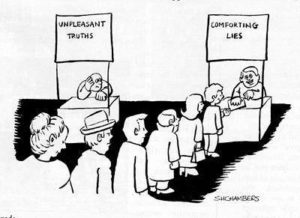When you consider the topic of honesty, one area you may not have considered is that of how much honesty you need. This is especially true in the aftermath of an affair.
First, honesty does not ‘just happen’. Honesty requires effort. Honesty also needs to be rigorous. That means that it needs to be thorough, accurate and precise.
I’m not talking the rigorous honesty as often used in affair recovery. Instead, I’m referring to being thorough. Your spouse needs to believe what you tell them. You must be believable. They need the ability to hang onto what you tell them.
When you say “Honey, I’m going to the store”, they trust that you’re going to the store and that’s it. Saying you’re going to the store doesn’t include hanging out at your friends for half and hour, going by the church, stopping by uncle Dan’s house and then the store.
Your spouse needs to believe that what you tell them is both accurate and true.
Although the term ‘rigorous honesty’ is often used in affair recovery, how it’s used raises questions. Rigorous honesty is often used like a club that one spouse uses on another. The club continues being used until it hurts either you or them.
Under the label of ‘rigorous honesty’ one spouse seeks out what you did, what you thought, what you felt, what you imagined, along with any fantasy you had along the way. They want to know everything.
When all that information is sought, a better term may be ‘exhaustive honesty’. It covers both what happened, what was imagined and what was fantasized about. That kind of honesty is too much for many of you. You may think you can handle it, yet once it is out in the open, you find it ‘s more than you bargained for.
Getting into fantasies and imaginations opens up the dimension of “hypothetical”. I learned long ago that hypothetical questions and their answers are generally emotional minefields and traps. They are distracting and dangerous.
The kind of rigorous honesty where you push until you reach a specified pain level isn’t healthy. Associating honesty with pain is a sure way of discouraging honesty in the future.
Another question is that of “How much honesty can you handle?” If you can’t handle honesty, and what it brings up, then you may want to reconsider what you are asking for.
Too much honesty is potentially dangerous. Too little honesty is also dangerous. Restricting what you tell your spouse also limits their ability to trust you. Honesty often requires navigating between the extremes.
Avoiding or choosing not to answer their questions, gives your spouse permission to ‘fill in the blank’ with the answers they suppose. When your spouse ‘fills in the blank’, they often select answers their mind is telling them rather than what actually happened.
You’ve got to be honest with yourself and with them. Any shortcuts in disclosure creates potential short circuits in your marriage.
Tell them what you did without excusing it.
Answer the questions without evasion. If you don’t know, you don’t know. If you say you don’t know, but you actually do, you’re lying.
If you don’t understand what they are asking, seek clarification. Good honest communication only comes about with confrontation, clarity and acceptance.
Be clear in your answers. Taking the long route in answering them makes you look guilty.
As honesty develops it helps both you and your spouse. The more the two of you work at improving honesty, the more natural it becomes. Like any skill, the more you develop it, the better the two of you will become at it.
Too much or too little honesty each do their own kind of damage. The right amount of honesty is when it adequately answers the questions. It should be thorough and provide solid information.
This means playing word games or dancing around hidden or cryptic meanings are not something you should do. Those strategies may ease your guilt, but it does not give straight forward answers.
Best Regards,
Jeff
P. S. -Honesty is only a starting point in affair recovery. Recovery includes rebuilding trust. If you want more information on rebuilding trust in your marriage, you may want to consider the Trust Formula, where I cover the other foundational issues needed in restoring trust.


















3 Responses
Well I know I comment on here every now and then. I do enjoy reading your blog. So you know the two of us are in individual therapy and a long way away from marriage council. But do you believe it is too much information to ask these questions?
1. Did you have sex with?
2. Did you kiss or have any intimacy with.
3. How many times did you see them?
4. Did you send sexual text or pictures to?
I asked these basic questions post discovery related to other male suitors she had been in contact with.
Later it was discovered she did not answer these questions honestly. So what does one think? What I do know is she found a male 20 years younger and for 4 years would hook up with him on and off. She also had an ex boyfriend she reconnected with from high school but denies sex. But in the above questions she lied about how often they had been together. How does one even sift through all this? Or why would one want too?
David,
I see those questions as reasonable. Unreasonable would be those about emotional states, thoughts, and sensation related items. You’re not asking for too much with the questions you posed.
Well one thinks they need to know those also. I did try to keep it at a yes or no level. Seems yes or no was too much to ask…. That by the way, makes the spouse fill in way too many blanks. Seems the bad choices and decisions do not go away.